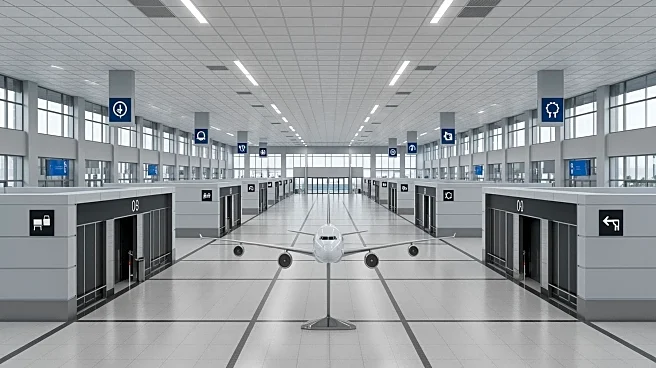What's Happening?
United Airlines is set to expand its flight offerings from O'Hare International Airport next year, adding ten new domestic destinations. This expansion is facilitated by the acquisition of five new gates
through the city's airport gate reallocation process. The new destinations include Santa Barbara, California; Eugene, Oregon; Paducah, Kentucky; and Rochester, Minnesota, among others, with services commencing in the spring and summer of next year. The gate reallocation process, governed by a 'use it or lose it' provision in a lease agreement signed in 2018, reallocates gates based on an airline's flying frequency from the previous year. United's acquisition of these gates follows a legal dispute with American Airlines, which lost four gates in the process. A Cook County judge ruled in favor of the city, officially granting United the new gates on October 1.
Why It's Important?
The expansion of United Airlines' routes from O'Hare International Airport is significant for several reasons. It enhances United's operational capacity and strengthens its position at one of the nation's busiest airports, potentially increasing its market share. The new routes will provide more travel options for consumers, potentially boosting tourism and business travel to the newly connected cities. Additionally, the legal resolution of the gate reallocation dispute underscores the competitive dynamics in the airline industry, where gate access at major airports is a critical asset. This development may influence future negotiations and legal strategies among airlines vying for prime airport real estate.
What's Next?
With the new gates secured, United Airlines is poised to implement its expanded flight schedule next year. The airline will likely focus on marketing these new routes to attract travelers and maximize the use of its increased capacity. Meanwhile, American Airlines may reassess its strategy at O'Hare following the loss of gates, potentially seeking alternative ways to maintain its competitive edge. The city of Chicago may continue to monitor and adjust its gate allocation policies to ensure fair competition and optimal airport utilization. Stakeholders, including passengers and local businesses, will be watching closely to see how these changes impact travel patterns and economic activity.
Beyond the Headlines
The gate reallocation process at O'Hare highlights broader issues in airport management and airline competition. It raises questions about the fairness and transparency of gate allocation procedures, which can significantly impact airline operations and market dynamics. The legal battle between United and American Airlines may set precedents for how similar disputes are handled in the future, potentially influencing regulatory policies. Additionally, the expansion of flight routes can have environmental implications, as increased air traffic may contribute to higher emissions, prompting discussions on sustainable aviation practices.











